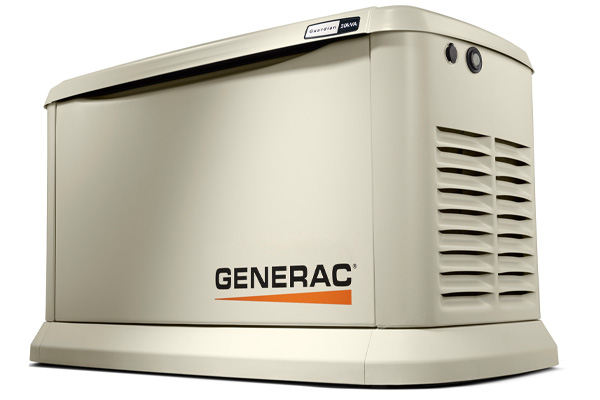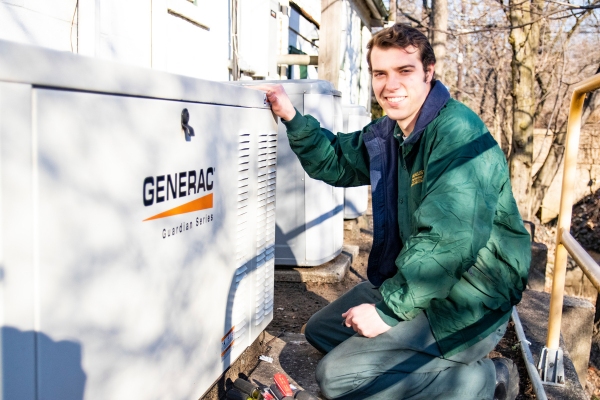Whole House Backup Generator Or Portable Generators: Making the Right Choice

Making sure your home remains powered during unforeseen outages is essential for comfort and security. Homeowners deliberating on backup power solutions commonly weigh the merits of a whole house backup generator against those of portable units. Both choices offer specific benefits and entail considerations vital to making an informed decision. This article from McAllister Energy explores the fundamental differences, advantages, and critical considerations in choosing between whole-house and portable generators for your home.
Grasping the Fundamentals of Generators
Contents
- 1 Grasping the Fundamentals of Generators
- 2 Whole-House vs. Portable Generators: Key Considerations
- 3 Automatic Startup of a Whole House Backup Generator
- 4 Essential Professional Installation for Whole House Backup Generators
- 5 Conclusion
- 6 Contact McAllister Energy for Your Whole House Backup Generator Needs
Whole house backup generators and portable generators have distinct roles and different capacities. Whole house generators, which are installed permanently, have the capability to supply power to an entire residence during grid failures. These systems are integrated into the home’s electrical panel and operate on a steady fuel supply, typically natural gas or propane.
On the other hand, portable generators are compact, movable units designed to be positioned where needed around the home. They offer a temporary power solution for critical appliances and devices when the power goes out, using either gasoline or propane for fuel.
Whole-House vs. Portable Generators: Key Considerations
The following sections outline essential factors to consider when choosing between these generator systems. Power Capacity and Coverage Whole-house backup generators boast a significant power capacity ranging from 15,000 to 50,000 watts or more. This high capacity allows them to supply electricity to an entire home, covering vital circuits like lighting, HVAC systems, refrigerators, and other essential appliances.
Portable generators typically provide a narrower power range, from 1,000 to 10,000 watts. Although capable of energizing essential appliances, their limited capacity may not accommodate the simultaneous power demands of an entire household.
Whole-house generators stand out by delivering extensive coverage, ensuring all essential circuits remain functional during a power outage. In contrast, portable generators necessitate more strategic power use management.
Automatic Startup of a Whole House Backup Generator

Whole-house generators enhance user convenience through their automatic startup feature during power outages. Equipped with an automatic transfer switch (ATS), these systems can detect a power loss and activate the generator seamlessly. In contrast, portable generators demand a manual approach, which includes:
- Manually starting the generator
- Hooking up the appliances
- Monitoring the fuel supply
The automatic functionality of whole-house generators ensures power is restored effortlessly, providing a no-hassle backup power solution.
Ensure your home’s continuous power with McAllister Energy’s expert whole house generator services. Contact us today!
Effortless Operation of Standby Generators
Thanks to an automatic transfer switch (ATS), whole-house generators activate effortlessly during power interruptions. This switch senses the outage and powers up the generator within seconds, ensuring continuous electricity flow to your home. Conversely, portable generators necessitate manual initiation and connection, leading to a discernible delay in restoring power during the transfer period.
Uninterrupted Generator Fuel Supply
Whole-house generators are designed with a continuous fuel supply, typically connected to your home’s natural gas line or a substantial propane tank. This setup allows the generator to operate for prolonged periods without any interruptions. In contrast, portable generators need regular refueling with gasoline or propane, which can become quite burdensome during extended power outages.
Back-up Generator: Durable Long-Term Power Solutions

Whole-house backup generators are engineered as durable, long-lasting solutions. They are constructed to endure diverse weather conditions and can provide many years of reliable service with appropriate maintenance. Conversely, portable generators typically have shorter lifespans and may necessitate more frequent repairs or replacements, rendering them less ideal for sustained backup power needs.
Whole-House Generator & Reduced Noise Impact
Thanks to sophisticated sound-reduction technologies that minimize noise output, whole-house generators are notably quieter than portable models. This feature makes them less intrusive to your household and neighbors when used. On the other hand, portable generators typically generate more noise, leading to considerable sound pollution. This becomes particularly problematic during prolonged power outages.
Boosting Property Value

Whole-house generators are a valuable addition to any property, often leading to a significant increase in home value. Regarded as permanent installations, these systems integrate seamlessly with your home’s electrical setup, making them a desirable asset for potential buyers looking for reliable, long-term power solutions.
Conversely, portable generators are seen as temporary measures and do not offer the same enhancement to property value. Buyers frequently prefer homes equipped with whole-house generators, recognizing the added convenience and security they provide during power disruptions, elevating the overall property value.
Essential Professional Installation for Whole House Backup Generators

The significance of professional installation cannot be overstated for whole-house generators, which are intricately linked to your home’s electrical framework. Certified electricians and HVAC technicians possess the necessary skills to evaluate your home’s requirements meticulously, select the ideal generator size, and ensure a safe and effective installation.
Conversely, the improper installation of portable generators can lead to significant safety hazards. For example, connecting a portable generator directly to your home’s wiring without a transfer switch can cause dangerous back-feed into utility lines, posing risks to utility workers and potentially causing fire hazards. Both generator types must adhere to professional installation standards and safety protocols. Still, it is especially vital for whole-house systems due to their complex integration with home infrastructure.
Don’t let power outages disrupt your life—trust McAllister Energy for reliable whole-house generator installation and maintenance.
Maintenance and Monitoring
Whole-house generators typically include advanced monitoring and maintenance features that automate necessary checks. These systems conduct regular self-assessments to ensure they remain in peak operational condition. Should any issues be detected, the generator can alert the homeowner or a designated monitoring service, facilitating prompt maintenance or repairs by qualified professionals. This automated monitoring significantly reduces the need for homeowners to manage and maintain their generators actively.
Portable generators demand a more hands-on approach to maintenance. Owners are responsible for manually checking oil levels, ensuring fuel stability, and inspecting other components. Maintenance tasks such as replacing filters also fall to the owner. Unlike whole-house systems, portable generators do not have automated self-diagnostic features, placing the burden of regular upkeep squarely on the owner’s shoulders.
Environmental Impact

Whole-house generators, particularly those fueled by natural gas or propane, are typically more environmentally friendly than portable generators. They emit cleaner byproducts and comply with more stringent emission standards. Natural gas models, in particular, release fewer pollutants and greenhouse gases than diesel or gasoline-powered ones.
Additionally, whole-house generators are usually more fuel-efficient, translating into less fuel use and reduced overall emissions. Opting for a whole-house generator that utilizes cleaner fuel sources and produces lower emissions is a step towards a more sustainable backup power approach. Conversely, portable generators, which often depend on gasoline or diesel, are generally less favorable for the environment due to their higher emissions.
Get peace of mind with McAllister Energy’s professional whole house generator services. Reach out to our team today!
Enhanced Emergency Readiness
Whole-house generators significantly boost emergency preparedness by ensuring a dependable, uninterrupted power supply during lengthy outages. They are integral in sustaining crucial home functions such as heating in winter, air conditioning in summer, refrigeration to avoid food spoilage, and providing power for necessary medical equipment.
This readiness allows households to endure prolonged power disruptions comfortably and safely without losing access to essential services. In contrast, portable generators, while helpful, offer less reliability and convenience due to their limited capacity and the necessity for manual operation.
Conclusion
A whole house backup generator represent a robust solution for dependable, long-term power provision during outages. They stand out due to their substantial capacity, automatic startup, smooth operational transition, and low maintenance demands, all of which contribute to a sense of security and enhanced safety.
The decision between whole-house and portable generators should consider factors like long-term power requirements and the value of convenience, safety, and property enhancement. Investing in a whole-house generator is prudent for homeowners aiming for an uninterrupted and hassle-free power supply during emergencies.
Contact McAllister Energy for Your Whole House Backup Generator Needs
McAllister Energy provides expert generator installation services throughout Camden County, NJ. We specialize in standby generator installations and offer comprehensive repair, replacement, and maintenance services. Our team comprises highly skilled, professionally certified contractors proficient in modern HVAC and generator technologies.
For more details on our whole-house generator services, please do not hesitate to call or visit our website. Rely on our experienced HVAC specialists for all your generator-related needs. We provide free, in-home estimates.
You can click here to contact us now or call us at (856) 665-4545 to find out more! Click the link to view our service area.

Related Articles: